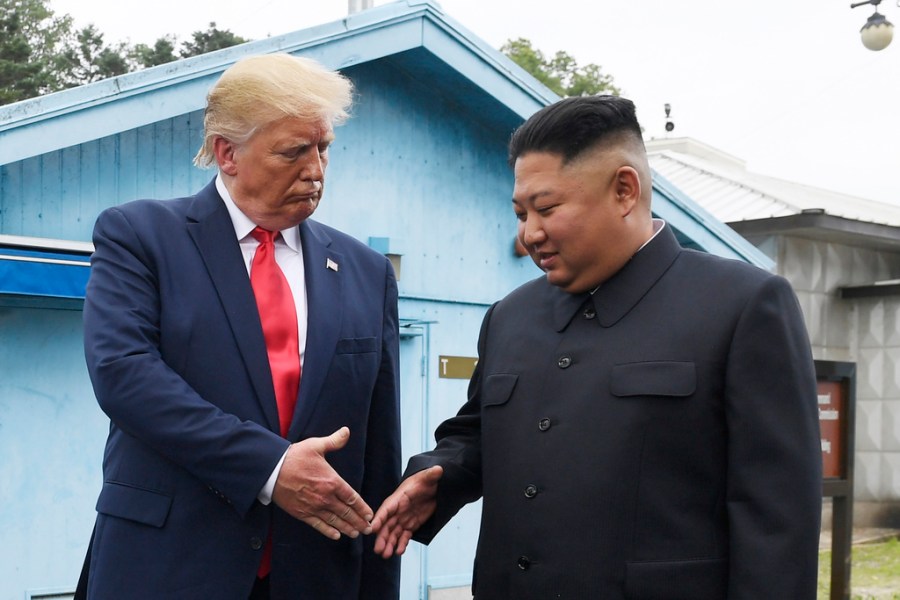
As President Trump begins his second term, the question of North Korea’s denuclearization has resurfaced with renewed anxiety. The White House has reiterated Trump’s commitment to pursuing the complete denuclearization of North Korea, a goal that has eluded previous administrations. Yet Trump’s recent acknowledgment of North Korea as a “nuclear power” suggests a possible shift from the traditional U.S. stance on denuclearization.
Trump has also expressed his intention to engage with Kim Jong Un once again. However, for obvious reasons, his recent reference to North Korea as a nuclear power has sparked concerns about a potential shift in U.S. policy. While Trump’s remarks suggest an acknowledgment of North Korea’s nuclear capabilities, the fact is that recognizing it as a nuclear state is fraught with procedural challenges — such recognition is virtually impossible at the moment due to the complex international dynamics at play.
North Korean leader Kim Jong-un is seeking to capitalize on Trump’s second presidency. Kim has previously leveraged geopolitical tensions, such as Russia’s struggles in Ukraine, to his advantage.
With Trump calling Kim his “friend,” North Korea may once again adjust its strategies to exploit this dynamic. Meanwhile, NATO, China and South Korea are bracing themselves for the repercussions of Trump’s “America first” policy, which has disrupted global security balances and amplified a sense of crisis among U.S. allies. For North Korea, Trump’s return offers an opportunity to revisit unfinished objectives.
Kim’s past negotiations with Trump, framed as indicative of “aggressive and hostile” U.S. policy, could be a calculated strategy to capture Trump’s attention. Recent provocations, such as the launch of a suspected hypersonic missile and short-range ballistic missiles just weeks before Trump’s inauguration, suggest that he is trying to enhance its leverage in negotiations.
However, any deal is likely to be limited in scope, possibly involving a freeze on intercontinental ballistic missile development in exchange for partial sanctions relief. Such an agreement could effectively nullify UN sanctions and solidify North Korea’s status as a nuclear-weapon state.
Under the diplomatic and security framework of a second Trump administration, the Korean peninsula faces a heightened risk of conflict. Pyongyang, bolstered by its recent military pact with Moscow, has escalated provocations, including launching “trash balloons” aimed at the South. These actions are likely to continue until North Korea successfully draws the Trump administration to the negotiating table or achieves tangible results in negotiations, increasing the risk of military confrontation between the two Koreas.
The reshaping of the northeast Asian security framework and the resulting increase in instability are pressing concerns. As the mechanisms underpinning stability on the Korean peninsula weaken, countries in northeast Asia are poised to compete for a new balance of power. The intensifying U.S.-China rivalry and expanding military cooperation between Russia and North Korea have heightened the risk of igniting the powder keg on the Korean peninsula.
For South Koreans, the “Acheson Line” symbolizes a deeply rooted wartime trauma, tracing back to U.S. Secretary of State Dean Acheson’s exclusion of the Korean peninsula from the U.S. Asian defense perimeter before the Korean War. Reviving such a painful legacy would be a critical error for the Trump administration. Meanwhile, China faces a loss of significant influence over North Korea as Pyongyang shifts closer to Russia.
Vladimir Putin’s war in Ukraine has handed North Korea a golden ticket, one that Kim is cashing in with strategic precision. Long tethered to Beijing’s influence, Pyongyang is now cultivating better ties with Moscow, sending waves of North Korean troops to the Ukrainian front in exchange for much-needed economic and military rewards.
Gone are the days when Russia cooperated with Washington’s efforts to curtail North Korea’s nuclear ambitions. Now, Putin is leveraging North Korea as a convenient thorn in America’s side, a counterweight to U.S. dominance in the Pacific.
Putin needs ammunition, bodies and supplies; Kim needs money, weaponry and diplomatic cover. With Russia holding a veto at the U.N. Security Council, any additional sanctions against Pyongyang are a fantasy, while existing ones are enforced with little conviction. The longer this Moscow-Pyongyang axis grows, the harder it will become to pressurize North Korea.
To his credit, Trump’s diplomacy in 2019 broke the usual cycle of hostility and stalemate, though his critics were quick to deride his approach. If he gets another chance, he’ll need to tread carefully. North Korea’s nuclear capabilities have only advanced, and any future deal will be far less favorable than the one he once had within reach — assuming Pyongyang even pretends to negotiate at all.
The possibility of North Korea’s denuclearization under Trump’s second term remains uncertain. While Trump’s peculiar approach to diplomacy offers a glimmer of hope, the complex geopolitical landscape and North Korea’s strategic provocations present significant challenges. The international community must manage these dynamics carefully to achieve lasting peace and stability on the Korean peninsula.
Imran Khalid is a physician and has a master’s degree in international relations.












